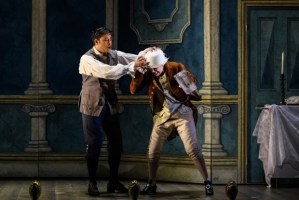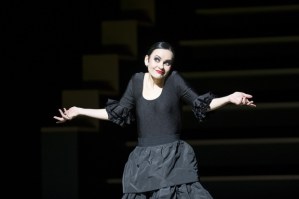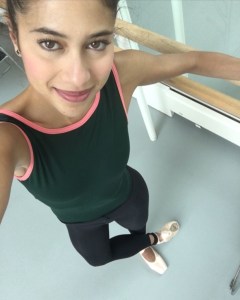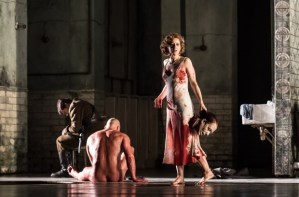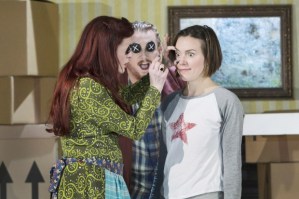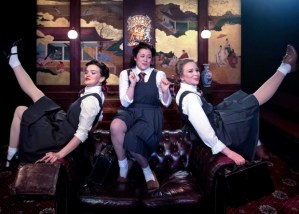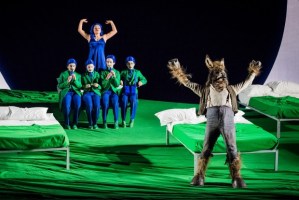Review: Lady Macbeth of Mtsensk (Royal Opera House)
The Royal Opera’s first revival in 12 years of Shostakovich’s darkly violent opera
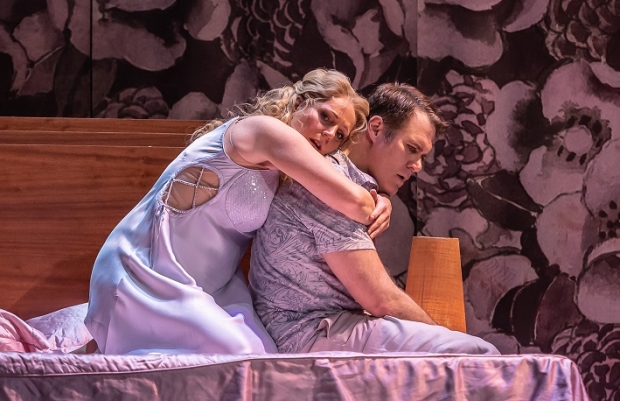
© Clive Barda
The Royal Opera's Macbeth double is an obvious gimmick. Antonio Pappano follows Verdi's Shakespearean tragedy with this once-notorious adaptation of Nikolai Leskov's tale, even though the works are unconnected and the latter's title is just catchpenny stuff. On the other hand, as Shostakovich's dark opera unfolds there is a more compelling link with three different entries in the company's recent repertory.
The abused heroine who turns murderous on her tormentor is a descendant of Lucia di Lammermoor; the gore-soaked killer who gets off on dismemberment recalls Salome and the depiction of her final desolation has parallels with From the House of the Dead. All this is especially true in Richard Jones's 2004 staging, here revived for the first time in 12 years (by the exemplary Elaine Kidd) with several of its previous leads returning.
Whether intentionally or not, that fearsome foursome of operas has given Covent Garden's 2017-18 season its backbone and provided some of the year's most memorable performances, none more that here. Dutch soprano Eva-Maria Westbroek gives a scalding, tragic portrayal of Shostakovich's desperate housewife trapped, in John Macfarlane's updated designs, in a grim high-rise of late Soviet brutalism. An unforgiving role, cruel on both voice and emotions, Katerina finds Westbroek at the peak of her powers: torn and stretched, exultant at first then destroyed by her quest to break free and be true to her instincts in a moralistic society. Her vocal sound, while not beautiful, is as intrepid and unfettered as her acting.
The ingredients of Shostakovich's 1932 opera are a violent swine, a feckless lover and a woman scorned. Chop lightly with an axe, season with rat poison et voilà. The work's realism enjoyed broad popular approval when it first appeared, perhaps because it offered wish-fulfilment to Soviet spectators whose own lives were as cowed as the heroine's. Yet Katerina's taste in men is questionable to say the least: she falls for a rapist, for heaven's sake. (There's another operatic parallel here with a second emotionally damaged protagonist, Berg's Wozzeck.)
The opera has humour amid the darkness, not least in the depiction of doltish policemen, an episode that led Stalin to denounce and ban the opera. However, the relentless comedy in Jones's production gives me pause. He chases after gags and tilts the opera too far from its horror. Moreover, the young Shostakovich made Katerina much more sympathetic than she is in the novel, and it's that heartbreaking identification with his flawed heroine that we should take from the evening rather than comedy heads sloshing around in carrier bags.
Connoisseurs of Richard Jones bingo will be calling ‘house' in no time. There's his trademark lurid wallpaper, headmasks for hooligans and cast members in cupboards. But his strengths are there too, not least a final scene (prisoners in transit, with more death en route) that has a searing brilliance. Matters were helped by a house debut of complexity and vocal command by American tenor Brandon Jovanovich as Sergey, Katerina's treacherous lover, and by secondary performances of comparable excellence by John Daszak (Zinovy, her cuckolded husband) and Mikhail Svetlov (the Police Inspector) among others. Only John Tomlinson as the appalling old father-in-law proved a disappointment, largely because these days it's hard to see beyond John Tomlinson in all he does. The ripely rotten Boris stayed hidden beneath his practised technique.
The last word belongs, emphatically, to the musicians of the Royal Opera Orchestra (including a much-in-evidence peripatetic brass ensemble) who played Shostakovich's massive score with verve and virtuosity under Pappano's fiery direction. Shostakovich's quasi-symphonic interludes hit home powerfully, often provoking the opposite emotions to those suggested by the story. It's bravura music that feels subversive, almost dangerous. Hot stuff.


